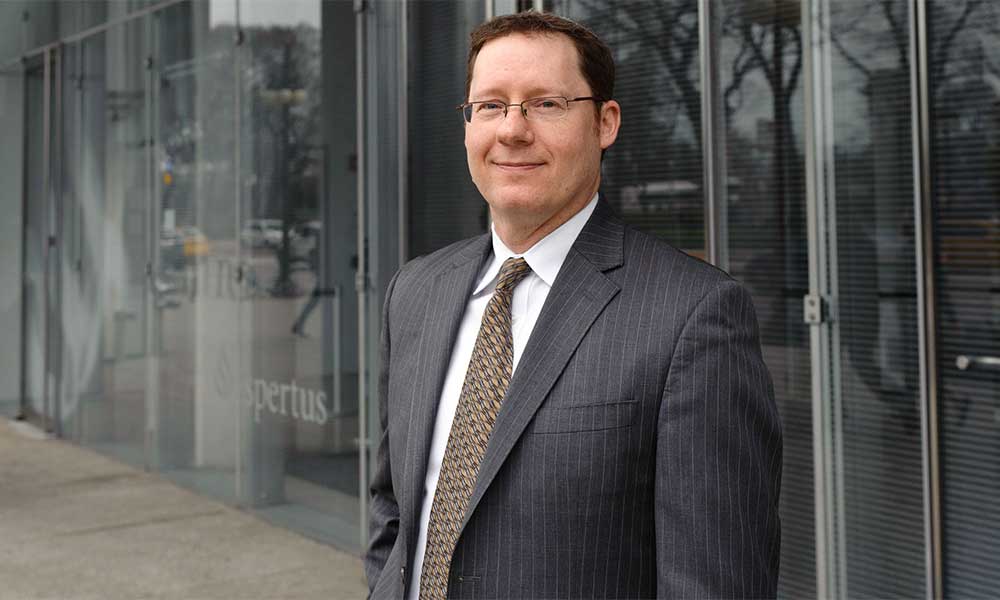Dean Bell has worked at the Spertus Institute for Jewish Learning and Leadership for 30 years, as associate dean, dean, vice president and now president. As Spertus celebrates its 100th birthday, Moment spoke with him about the institution’s history, goals and the need for open and critical conversations in an ever more polarizing world.
What are Spertus’s goals as an institution?
There are three groups of values that I see as historically underpinning the institution: One is around academic excellence—this idea that you should have meaningful, deep education in Jewish studies. The second is around community building and community responsibility. We are outside of the community as an accredited higher education institution, but we are deeply embedded in so many Jewish communities. And then the final group of values is around convening across differences. We have a lot of adult learners with varied backgrounds in our Jewish studies programs. It’s an opportunity for people with very different worldviews and needs to come together and engage in conversation. One of our central programs is something we call “Critical Conversations,” where we identify a theme or an issue, and then we bring people with different ideas, perspectives and experiences into conversation with one another.
Why is Spertus vital to the American-Jewish landscape?
We bring a Jewish perspective, texts and learning into conversation with big issues, and we do that in the context of higher education. There are a lot of great places that do adult Jewish education or grapple with big questions. And there are a lot of great universities that are teaching important critical thinking skills on specific topics. Spertus is fairly unique in that it brings those ideas together under the rubric of what we call “applied Jewish learning,” which means taking Jewish learning and applying it so that it can help solve problems and resolve issues.
Is there a certain profile of a person who’s drawn to Spertus?
Learning at Spertus gives you a sense of a broad Jewish ecosystem, where people from different places are coming and going. We attract people who are really open to interrogating their own perceptions and assumptions, and who strive to understand others. One of my favorite examples: I was interviewing a student for our Leadership Certificate in Combating Antisemitism who was a 40-year veteran Jewish community organizer. And I remarked, “Wow, you could teach in the program. Why are you registering for the program?” He said, “Because I want to understand the experiences of people in other places, and I don’t know everything.” Those are the kind of learners we get here, people who are hungry for learning. They see themselves as lifelong learners.
How has October 7 and the war that has followed changed the institute’s priorities?
Obviously the most significant thing that we’ve seen in many places is the rise of antisemitism. We saw that rise before October 7, and we launched the Leadership Certificate in Combating Antisemitism in 2022. Curiously, the flip side is there’s been a lot of growth in our Jewish studies programs, in part because people are feeling concerned about their Jewish identity and in part because they want to celebrate it and find connection.
Any organization, especially a Jewish one, reaching 100 is unusual. To what do you attribute Spertus’s longevity?
It does suggest that Spertus fills a niche and is able to adapt to changing needs. Many organizations, if they last 100 years, completely shift from where they were, and become a different kind of institution. But there has been a set of principles and values at the heart of our institution that have guided us and continue to guide us.
Spertus is a 100-year startup. What I mean by that is that it’s an institution that has a history and depth, but is always willing to ask different questions and try different things. We were an early leader in distance education. Already in the early 1990s, we were doing correspondence programs and in the early 2000s we were using online platforms for teaching regular weekly courses. So when COVID hit, we had no issue in pivoting to fully online. We’ve spent a lot of time thinking about the fact that we have adult learners. It means that you need to always be open and innovative because adults are really complicated, challenging people. Their personal lives get in the way. Their professional lives get in the way. We not only think about what content we are bringing to address their needs but how we can deliver it in a way that will be the most accessible and impactful.
As we move into the future, we are going to continue to engage in deep academic Jewish studies that move us forward to meet emerging needs in the Jewish community and in the broader society. I think that gives us a clear path for at least the next 100 years. I’m about to sign my contract for the next 100 years, so I’m ready to go!

